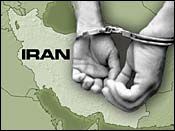|
|
|
Differences on Display in U.S., French Approach to Iran July 06, 2005 WASHINGTON -- Secretary of State Condoleezza Rice and her French counterpart tried to present a united front Tuesday against any Iranian ambitions for a nuclear weapon, but it was clear that Europeans and the United States still see the problem differently. Meanwhile, Iran's top nuclear official said he was pessimistic about forthcoming proposals from European negotiators in nonproliferation talks with Iran. The talks are due to resume in August, coinciding with the installation of a new government in Iran following election last month of hard-liner Mahmoud Ahmadinejad as president. Standing with Rice after a State Department meeting, French Foreign Minister Philippe Douste-Blazy suggested that Europeans might offer Iran unspecified security guarantees in exchange for giving up its nuclear program. He quickly added that the United States would need to agree. "I think what we need to do is to base ourselves on finding a package which is credible for the Iranians," Douste-Blazy said through a translator. Along with technical agreements that would give Iran seismological and meteorological equipment, the European negotiators should "make sure, also, that we discuss with them the security of their country," he said. Rice did not respond directly, but the United States has not expressed concern that Iran would risk its own security by giving up its nuclear program. Instead, the United States focuses on the threat it claims a nuclear Iran would pose to its neighbors and the world. "There must be objective guarantees that Iran is not surreptitiously gaining the technology or technological know-how that might lead to the development of a nuclear weapon," Rice said. "And that means enrichment, reprocessing and the entire - all of the activities associated with the fuel cycle." Iran rejects that position and insists that it will keep some part of the nuclear manufacturing process. Uranium enriched to low levels has energy uses, while highly enriched uranium can be used in bombs. Iran insists it is pursuing nuclear technology for peaceful purposes, such as generating power. Iran suspended all uranium enrichment-related activities in November to avoid possible sanctions from the U.N. Security Council, but it said all along that the suspension was temporary. "We have been very clear that we do not see the need for civilian nuclear power in Iran," Rice said. Douste-Blazy had a different view: "I'd like to say that France was the first to start the negotiations and discussions with Iran on the possibility of having civil nuclear energy." The United States broke diplomatic ties with Iran over the 1979 storming of the U.S. Embassy in Tehran, in which 52 Americans were held hostage for 444 days. The Bush administration has used harsh rhetoric to demand that Iran give up what it claims is a covert nuclear weapons program, but it agreed earlier this year to go along with a European program to try to talk Iran out of further nuclear development. France, like other European nations, has diplomatic relations with Tehran. France, Britain and Germany, which are negotiating on behalf of the European Union, have offered economic incentives in hopes of persuading Iran to halt enrichment permanently. The European effort has made little headway. Ahmadinejad's surprise victory may complicate the negotiations further. "We have taken note with the European Union of the election of President Ahmadinejad and we must say that we, as others, regret that not all candidates were able to run in the election," Douste-Blazy said. "But that's where we are now and we must now continue our diplomatic relations with Iran." The three European nations say they will propose a long-term accord on Iran's nuclear program in the coming weeks. In Tehran, the head of Iran's Atomic Energy Organization told the semiofficial Iranian Student News Agency that he doubts European diplomats can offer a workable proposal. "The Europeans have low capability to solve this case. I am not optimistic their proposal will capture Iran's interest," Gholamreza Aghazadeh was quoted as saying. |
